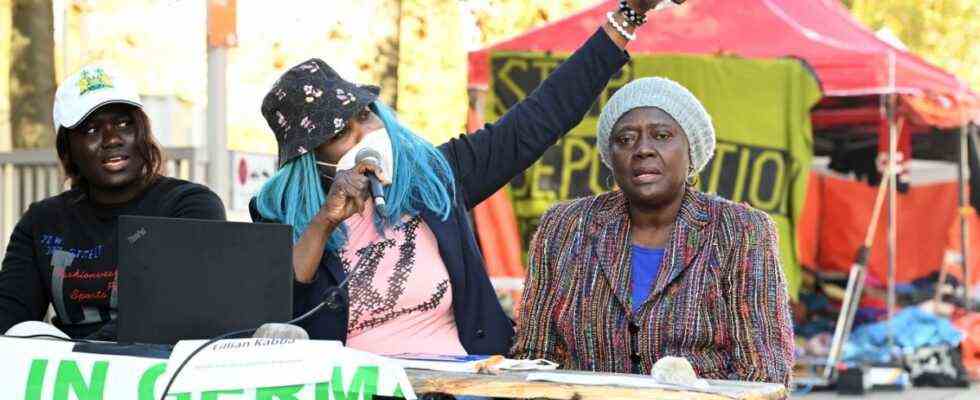The young woman has tears in her eyes as she speaks. “Women and girls in particular live dangerously there: there is a lot of domestic violence, sexual abuse and rape,” says Fatmata S. “We women have no voice there to speak.” There, that is the country from which the now 25-year-old fled to Germany five years ago. You and hundreds of compatriots in Munich and Bavaria now fear that they will be deported there again: to Sierra Leone.
For ten days, dozens to several hundred people have been demonstrating day and night on Hofmannstrasse in the south of Munich. Since then, hearings have been held at the Central Immigration Office to clarify identity by a Sierra Leonean embassy delegation. With these hearings, the inspectors want to find out whether the people who are registered as Sierra Leoneans in Bavaria actually come from the West African country.
According to the Bavarian Refugee Council, the physiognomy, dialect, any tattoos and knowledge of local traditions should be checked. For Hamado Dipama from the Munich Migration Advisory Council, these hearings are “racist practices based on arbitrary criteria”. On behalf of the Migration Advisory Council, he calls for “an immediate stop to the collective hearings and a safe stay and work permits in Bavaria for those affected”.
There are between 30 and 45 hearings at the agency every day
In fact, it is uncertain what will happen to the people being screened. An alliance that declares its solidarity with the demonstrators in Hofmannstrasse – including Fridays for Future Munich, the Mobilitätswendecamp, the Munich Caravan and the Munich Left – fears that many of those controlled could be deported. The Sierra Leonean community, on the other hand, appeals “to all responsible authorities to recognize the humanitarian plight of the people from Sierra Leone and to refrain from deportations. When we return to Sierra Leone we face persecution and punishment, torture and, in the worst case, murder.”
The State Office for Asylum and Repatriations (LfAR) in Ingolstadt is responsible for the authorities. A spokeswoman for the LfAR emphasizes that “between 30 and 45 appointments for a hearing are currently being allocated” every day. Since the beginning of the exams, there have even been police operations in asylum shelters to bring people to the hearings, as Katarina Grothe from the Bavarian Refugee Council learned. The spokeswoman for the state office confirms this indirectly: “In principle, there is an obligation to cooperate with the question of identity clarification.” If necessary, the obligation could also be “enforced by force, that is, against the will of the person concerned”.
According to the Refugee Council, many people from Sierra Leone who live in Bavaria are housed in the Landshut region, but also in Passau and Deggendorf. According to the statistical office, a total of 545 people from Sierra Leone were living in Munich at the end of 2020.
Many Munich politicians support the protest
One of them is Victor Kamara. On Wednesday afternoon he was sitting on a beer bench on Hofmannstrasse at a press conference of the protest camp and pointed to the group of demonstrators: “Look around, there are lots of young people here who want to work here.” Many have long since had work in Munich or other cities in Bavaria, and some have families with children. “And now they are trying to separate them from their children. But we have no future in Sierra Leone.” And Fatmata S. calls on the government in Germany: “I want people from Sierra Leone to be protected and deportations to be stopped.”
At least many Munich politicians support the people’s protest. In the past few days, representatives of various parties have come to the makeshift camp on the sidewalk. On Wednesday, the Left’s city council asked that Lord Mayor Dieter Reiter should work at the federal and state level to stop possible deportations of people and also the hearings.

